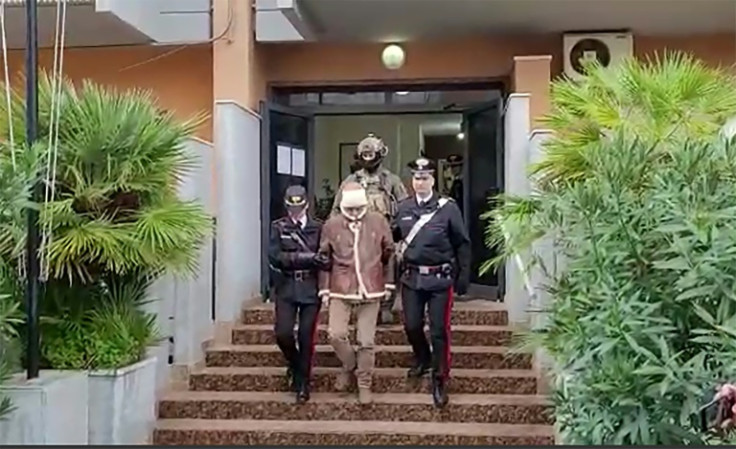Fugitive's Arrest Removes 'King' Of Weakened Sicilian Mafia

Matteo Messina Denaro's arrest leaves a power vacuum at the top of the Sicilian Mafia at a time when it is already being eclipsed by rivals -- but experts warn it is too soon to write the group off.
The 60-year-old Cosa Nostra boss, Italy's most wanted man, had been on the run for 30 years when he was arrested attending a medical appointment in Palermo on Monday.
The detention of a man known for his violence, a protagonist in some of the most notorious Mafia crimes, was hailed as a major blow to the organised crime group immortalised by the "Godfather" films.
Despite being a fugitive, prosecutors said Messina Denaro had remained an active boss in the western Trapani region of Sicily, which included his hometown of Castelvetrano.
In its latest report, covering 2021, Italy's anti-mafia investigative police (DIA) said there was no "top commander" of the Cosa Nostra, or Sicilian Mafia, which instead operates through inter-connected local units.
But it highlighted the role of Messina Denaro, "the contact person for all matters of major interest", including the resolution of disputes and top appointments, even beyond Trapani.
"Messina Denaro was a key point of reference for the whole Cosa Nostra," Antonio Balsamo, head of the judiciary in Palermo and an expert on mafia issues, told AFP.
"He led the Mafia organisation from the terrorist strategy of attacking the state, with the attacks of 1992 and 1993 -- in which he personally took a leading role -- to the new strategy of submersion (operating behind the scenes).
"It is clear he leaves an important void. But we must not make the mistake of underestimating the Sicilian Mafia.
"Even after the arrest of (notorious Mafia boss Toto) Riina 30 years ago, Cosa Nostra managed to regroup.
"This arrest must be seen as a starting point for a new collective effort against the mafia by the state."
Messina Denaro was one of Cosa Nostra's most brutal operators, involved in the murder of anti-mafia judge Giovanni Falcone in 1992 and deadly bombings in Florence, Milan and Rome in 1993 among others.
However in recent years the group, like other Italian mafia organisations, has shifted from violence to "infiltration into the economic and financial sectors", according to the DIA.
Despite Cosa Nostra being the most famous of Italy's gangs, it is the 'Ndrangheta, based in the southern Italian region of Calabria, that is considered the most powerful.
While it maintains a very low public profile, according to Interpol the 'Ndrangheta is the only Italian mafia organisation present on every continent, involved in a wide range of criminal activities from drug trafficking to extortion and the rigging of public contracts.
Roberto Saviano, the journalist who exposed the inner workers of the Naples-based Camorra mafia, described Messina Denaro as "the king" of Cosa Nostra.
"He was the last of the mass murderers, the man who carried out the violent massacres of the Cosa Nostra," Saviano told AFP.
"After which the organisation, precisely because of those decisions, weakened over the years", becoming "less strong economically", he said.
Investigators have been doggedly pursuing those involved in the bloodshed of 1992 and 1993, with relentless waves of arrests and seizures.
Assets worth 150 million euros were seized from Cosa Nostra in the second half of 2021 alone, the DIA said.
For another journalist and author Attilio Bolzani, the arrest marks "the end of a mafia era -- but this mafia era finished even earlier, 20 years ago".
"Cosa Nostra was the most powerful secret criminal organisation in the western world. Now it is an organisation that for 30 years has not managed to form a leadership.
"That mafia... which planted bombs has been defeated. It still lives on in assaults, drugs, extortion. It lives on in big business, in corruption, but it no longer manifests itself externally in the violence of weapons."
He added that Italy must now go after criminal organisations which are "more insidious, more hidden, more economic, more financial, more political".
© Copyright AFP 2024. All rights reserved.





















